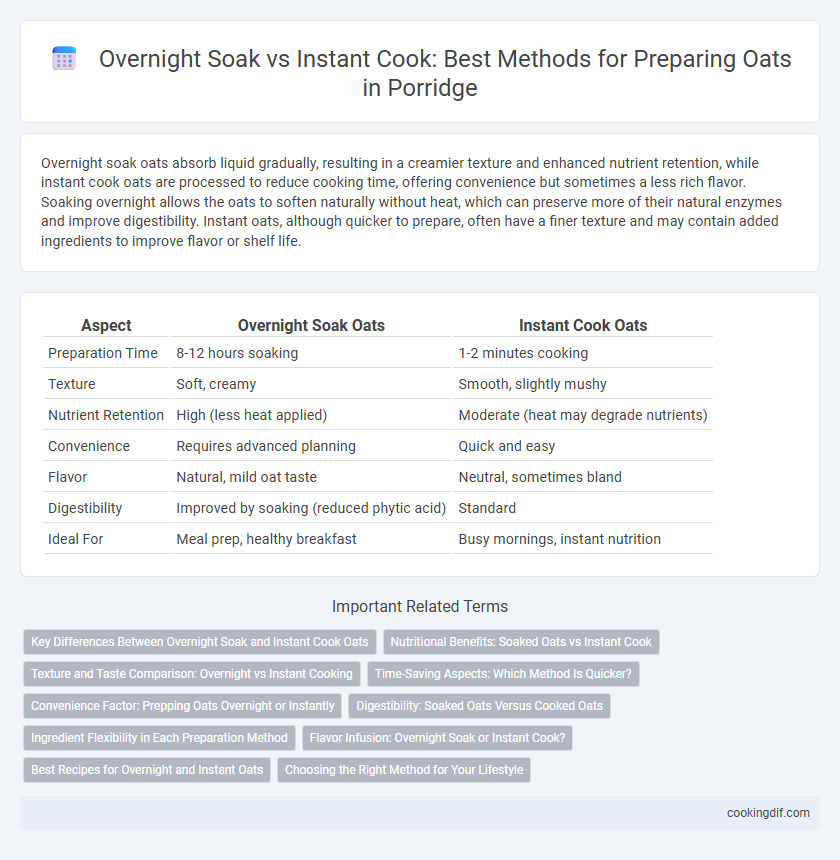Overnight soak oats absorb liquid gradually, resulting in a creamier texture and enhanced nutrient retention, while instant cook oats are processed to reduce cooking time, offering convenience but sometimes a less rich flavor. Soaking overnight allows the oats to soften naturally without heat, which can preserve more of their natural enzymes and improve digestibility. Instant oats, although quicker to prepare, often have a finer texture and may contain added ingredients to improve flavor or shelf life.
Table of Comparison
| Aspect | Overnight Soak Oats | Instant Cook Oats |
|---|---|---|
| Preparation Time | 8-12 hours soaking | 1-2 minutes cooking |
| Texture | Soft, creamy | Smooth, slightly mushy |
| Nutrient Retention | High (less heat applied) | Moderate (heat may degrade nutrients) |
| Convenience | Requires advanced planning | Quick and easy |
| Flavor | Natural, mild oat taste | Neutral, sometimes bland |
| Digestibility | Improved by soaking (reduced phytic acid) | Standard |
| Ideal For | Meal prep, healthy breakfast | Busy mornings, instant nutrition |
Key Differences Between Overnight Soak and Instant Cook Oats
Overnight soak oats absorb liquid for 6-12 hours, resulting in a creamy texture and enhanced nutrient retention, while instant cook oats undergo pre-cooking and drying, allowing quick preparation within minutes but with a softer texture. Overnight oats maintain more fiber integrity and lower glycemic index compared to instant oats, which often contain added sugars or preservatives for flavor and preservation. Choosing between the two depends on time availability, desired texture, and nutritional preferences for a wholesome porridge experience.
Nutritional Benefits: Soaked Oats vs Instant Cook
Overnight soaked oats retain more nutrients like vitamins, minerals, and antioxidants due to reduced heat exposure, preserving their nutritional integrity. Instant cook oats undergo higher heat and processing, which can degrade sensitive nutrients and slightly lower their fiber content. Soaked oats also promote better digestion and nutrient absorption through natural enzymatic activity during soaking.
Texture and Taste Comparison: Overnight vs Instant Cooking
Overnight soaked oats develop a creamier texture and richer, more complex flavor due to prolonged soaking, which allows natural enzymes to break down starches and release sweetness. Instant cooked oats tend to have a softer, sometimes mushier consistency with a milder taste, as rapid heat application can diminish subtle flavors. Texture preference often depends on whether a firm, chewy bite or a smooth, porridge-like mouthfeel is desired.
Time-Saving Aspects: Which Method Is Quicker?
Instant cook oats significantly reduce preparation time by requiring only 1 to 2 minutes of cooking, making them ideal for quick breakfasts. Overnight soaking demands at least 6 to 8 hours, allowing oats to soften naturally without heating but requiring prior planning. For immediate convenience and speed, instant cook oats outperform overnight soaking in time efficiency.
Convenience Factor: Prepping Oats Overnight or Instantly
Overnight soak oats require minimal morning effort as they are prepared the night before, offering a grab-and-go convenience ideal for busy schedules. Instant cook oats provide rapid preparation in just a few minutes, catering to those needing a quick meal without prior planning. Both methods optimize time management, with overnight soaking emphasizing readiness and instant cooking emphasizing speed.
Digestibility: Soaked Oats Versus Cooked Oats
Soaking oats overnight breaks down phytic acid and reduces anti-nutrients, enhancing digestibility and nutrient absorption. Instant cooked oats undergo heat processing that softens fibers, making them easier to digest, but may slightly reduce some heat-sensitive nutrients. For optimal digestive comfort, soaked oats often cause less bloating and improve gut health through natural enzymatic activity.
Ingredient Flexibility in Each Preparation Method
Overnight soak oats offer greater ingredient flexibility by allowing a variety of mix-ins like fruits, nuts, and seeds to meld and soften naturally over time. Instant cook oats typically require quick-cooking ingredients that withstand brief cooking, limiting the range of additions primarily to powders or pre-tenderized fruits. This distinction impacts flavor infusion and texture customization in porridge preparation.
Flavor Infusion: Overnight Soak or Instant Cook?
Overnight soak allows oats to absorb liquid slowly, enhancing flavor depth and creating a creamier texture through natural fermentation. Instant cook oats, while convenient, tend to have a blander taste due to shorter hydration time, limiting flavor infusion. Choosing overnight soaked oats maximizes taste complexity and nutrient availability compared to instant cooking methods.
Best Recipes for Overnight and Instant Oats
Overnight oats require an extended soak of 6-8 hours, allowing oats to absorb moisture and develop a creamy texture without cooking, ideal for recipes featuring yogurt, chia seeds, and fresh fruit toppings. Instant oats soften within minutes when hot water is added, perfect for quick porridge recipes enhanced with cinnamon, mashed bananas, or protein powder for immediate consumption. Both methods offer versatile options to customize nutrient-rich breakfasts based on preparation time and desired texture.
Choosing the Right Method for Your Lifestyle
Overnight soak oats offer a convenient, no-cook method ideal for busy mornings and preserving nutrients, while instant cook oats provide a quick, warm option perfect for those needing fast, hot breakfasts. Nutrient retention is higher in soaked oats due to minimal heat exposure, whereas instant oats deliver speed and warmth but may lose some fiber and vitamins during processing. Selecting between overnight soak and instant cook oats depends on time availability, texture preference, and desired nutrient intake.
Overnight soak vs Instant cook for oats preparation Infographic

 cookingdif.com
cookingdif.com